Lint
Background
Lint is a kind of static analysis tool, which originated from the C language. Lint tools usually check potential problems and errors in code, including (but not limited to) programming style (indentation, blank lines, spaces), code quality (unused variables, missing documents), and error codes (division by zero, duplicate definitions, circular references). Generally speaking, in addition to identifying errors, lint tools also have some fix/refactor suggest and auto fix capabilities. Using lint tools in the project can effectively reduce errors and improve the project quality. In addition, for a programming language, the lint tool is usually a prerequisite for the development of other tools, such as the error prompt of IDE plug-ins(e.g., LSP) and the pipeline detection of CI.
Lint vs. LintPass
Concepts
There are two main structures about lint in Rustc, Lint and LintPass. First, we need to distinguish the concepts of Lint and LintPass. In many documents of Rustc, they are both referred to as 'Lint', which is easy to confuse. The difference between them is explained by rustc-dev-guide as follows:
Lint declarations don't carry any "state" - they are merely global identifiers and descriptions of lints. We assert at runtime that they are not registered twice (by lint name). Lint passes are the meat of any lint.
In terms of definition, Lint is just a description of the lint check defined, such as name, level, description, code and other attributes. It doesn't carry any state of checking. Rustc checks the uniqueness of registered lints at runtime. LintPass is an implementation of lint, which contains the check_* methods that are called when checking.
In terms of code implementation, Lint is defined as a struct in Rust, and all lint definitions are an instance of this struct. And LintPass is a trait. The Trait is similar to the interface in Java/C++. Every definition of lintpass needs to implement the methods defined in the interface.
#![allow(unused)] fn main() { /// Specification of a single lint. #[derive(Copy, Clone, Debug)] pub struct Lint { pub name: &'static str, /// Default level for the lint. pub default_level: Level, /// Description of the lint or the issue it detects. /// /// e.g., "imports that are never used" pub desc: &'static str, ... } pub trait LintPass { fn name(&self) -> &'static str; } }
It should be noted that although we just said that trait is similar to an interface and Lint is a struct, the relationship between Lint and LintPass is not a "class" and its "methods" in OO. Instead, declaring LintPass will generate a struct with the same name, this struct implements the trait, and the get_lints() method in this struct will generate the corresponding Lint definition.
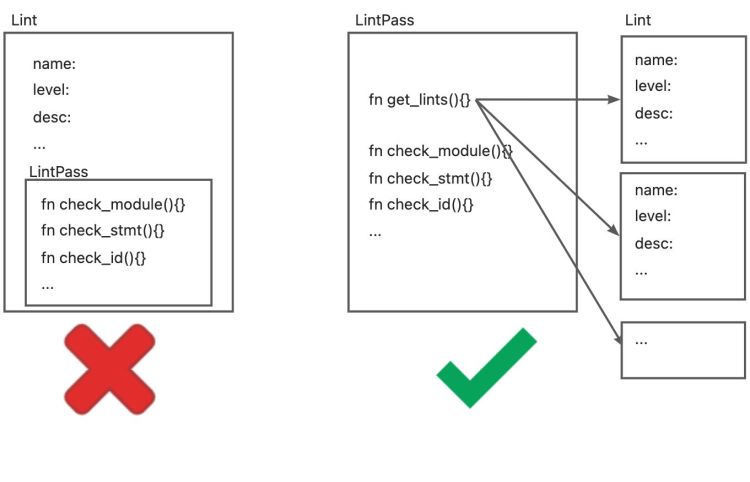
This is also consistent with the description of the rustc-dev-guide:
A lint might not have any lint pass that emits it, it could have many, or just one -- the compiler doesn't track whether a pass is in any way associated with a particular lint, and frequently lints are emitted as part of other work (e.g., type checking, etc.).
Definition of Lint and LintPass
Rustc provides macros for both Lint and LintPass to define their structure.
The macro declare_lint that defines Lint is simple, it can be found in rustc_lint_defs::lib.rs. The declare_lint macro parses the input arguments and produces a Lint struct named $NAME.
#![allow(unused)] fn main() { #[macro_export] macro_rules! declare_lint { ($(#[$attr:meta])* $vis: vis $NAME: ident, $Level: ident, $desc: expr) => ( $crate::declare_lint!( $(#[$attr])* $vis $NAME, $Level, $desc, ); ); ($(#[$attr:meta])* $vis: vis $NAME: ident, $Level: ident, $desc: expr, $(@feature_gate = $gate:expr;)? $(@future_incompatible = FutureIncompatibleInfo { $($field:ident : $val:expr),* $(,)* }; )? $($v:ident),*) => ( $(#[$attr])* $vis static $NAME: &$crate::Lint = &$crate::Lint { name: stringify!($NAME), default_level: $crate::$Level, desc: $desc, edition_lint_opts: None, is_plugin: false, $($v: true,)* $(feature_gate: Some($gate),)* $(future_incompatible: Some($crate::FutureIncompatibleInfo { $($field: $val,)* ..$crate::FutureIncompatibleInfo::default_fields_for_macro() }),)* ..$crate::Lint::default_fields_for_macro() }; ); ($(#[$attr:meta])* $vis: vis $NAME: ident, $Level: ident, $desc: expr, $lint_edition: expr => $edition_level: ident ) => ( $(#[$attr])* $vis static $NAME: &$crate::Lint = &$crate::Lint { name: stringify!($NAME), default_level: $crate::$Level, desc: $desc, edition_lint_opts: Some(($lint_edition, $crate::Level::$edition_level)), report_in_external_macro: false, is_plugin: false, }; ); } }
The definition of LintPass involves two macros:
- declare_lint_pass: Generate a struct named
$nameand call the macroimpl_lint_pass.
#![allow(unused)] fn main() { macro_rules! declare_lint_pass { ($(#[$m:meta])* $name:ident => [$($lint:expr),* $(,)?]) => { $(#[$m])* #[derive(Copy, Clone)] pub struct $name; $crate::impl_lint_pass!($name => [$($lint),*]); }; } }
- impl_lint_pass: Implements the
fn name()andfn get_lints()methods for the generatedLintPassstructure.
#![allow(unused)] fn main() { macro_rules! impl_lint_pass { ($ty:ty => [$($lint:expr),* $(,)?]) => { impl $crate::LintPass for $ty { fn name(&self) -> &'static str { stringify!($ty) } } impl $ty { pub fn get_lints() -> $crate::LintArray { $crate::lint_array!($($lint),*) } } }; } }
EarlyLintPass and LateLintPass
In the macro definition of LintPass, only the fn name() and fn get_lints() methods are defined, but the check_* functions for checking are not provided. This is because Rustc divides LintPass into two more specific categories: EarlyLintPass and LateLintPass. The main difference is whether the checked element has type information, i.e. is performed before or after the type checking. For example, WhileTrue checks for while true{...} in the code and prompts the user to use loop{...} instead it. This check does not require any type information and is therefore defined as an EarlyLint (impl EarlyLintPass for WhileTrue in the code.
#![allow(unused)] fn main() { declare_lint! { WHILE_TRUE, Warn, "suggest using `loop { }` instead of `while true { }`" } declare_lint_pass!(WhileTrue => [WHILE_TRUE]); impl EarlyLintPass for WhileTrue { fn check_expr(&mut self, cx: &EarlyContext<'_>, e: &ast::Expr) { ... } } }
Rustc uses 3 macros to define EarlyLintPass:
- early_lint_methods: early_lint_methods defines the
check_*functions that need to be implemented inEarlyLintPass, and passes these functions and the received parameters$argsto the next macro.
#![allow(unused)] fn main() { macro_rules! early_lint_methods { ($macro:path, $args:tt) => ( $macro!($args, [ fn check_param(a: &ast::Param); fn check_ident(a: &ast::Ident); fn check_crate(a: &ast::Crate); fn check_crate_post(a: &ast::Crate); ... ]); ) } }
- declare_early_lint_pass: Generate trait
EarlyLintPassand call macroexpand_early_lint_pass_methods.
#![allow(unused)] fn main() { macro_rules! declare_early_lint_pass { ([], [$($methods:tt)*]) => ( pub trait EarlyLintPass: LintPass { expand_early_lint_pass_methods!(&EarlyContext<'_>, [$($methods)*]); } ) } }
- expand_early_lint_pass_methods: Provides default implementations for
check_*methods: nothing to do({}in code).
#![allow(unused)] fn main() { macro_rules! expand_early_lint_pass_methods { ($context:ty, [$($(#[$attr:meta])* fn $name:ident($($param:ident: $arg:ty),*);)*]) => ( $(#[inline(always)] fn $name(&mut self, _: $context, $(_: $arg),*) {})* ) } }
The benefits are as follows:
- Because
LintPassis a trait, every definition ofLintPassneeds to implement all of its methods. But early lint and late lint occur at different stages of compilation, and the input parameters are also different (AST and HIR). Therefore, the definition of LintPass contains only two general methodsfn name()andfn get_lints(). The check methods are defined in the more specificEarlyLintPassandLateLintPass. - Likewise, for
EarlyLintPass, every definition of lintpass must implement all of its methods. But not every lintpass needs to check all nodes of the AST.expand_early_lint_pass_methodsprovides default implementations for its methods. In this way, when defining a specific lintpass, you only need to pay attention to implementing its related check methods. For example, for the definition ofWhileTrue, sincewhile true { }only appears in theast::Exprnode, it only needs to implement thecheck_exprfunction. Calling theWhileTruecheck function at any other node, such as callWhileTrue.check_ident()when checking an identifier node on the AST, will only execute an empty method as defined in the macroexpand_early_lint_pass_methods.
Meaning of pass
In Rustc, in addition to Lint and LintPass, there are some *Pass naming, such as Mir and MirPass, the rustc_passes package, etc. The Compilers, Principles, Techniques, & Tools has a corresponding explanation for Pass:
1.2.8 Combine multiple steps into a pass The previous discussion of steps was about the logical organization of a compiler. In a particular implementation, the activities of multiple steps can be combined into a pass. Each pass reads in an input file and produces an output file.
In the macro declare_lint_pass that declares LintPass, its second parameter is a list, indicating that a lintpass can generate multiple lints. There are also some CombinedLintPass in Rustc that also aggregates all built-in lints into one lintpass. This is basically the same as the definition of "pass" in the Dragon Book: LintPass can combine multiple Lint checks, each LintPass reads an AST/HIR and produces a corresponding result.
Simple design of Linter
In the definition of LintPass, a default implementation is provided for all check_* methods of each lintpass. So far, we can implement a simple Linter tool:
#![allow(unused)] fn main() { struct Linter { } impl ast_visit::Visitor for Linter { fn visit_crate(a: ast:crate){ for lintpass in lintpasses{ lintpass.check_crate(a) } walk_crate(); } fn visit_stmt(a: ast:stmt){ for lintpass in lintpasses{ lintpass.check_stmt(a) } walk_stmt(); } ... } let linter = Linter::new(); for c in crates{ linter.visit_crate(c); } }
Visitor is a tool for traversing the AST. Here, the visit_* methods are implemented for Linter, and all lintpass check_* methods are called during traversal. walk_* will continue to call other visit_* methods to traverse its child nodes. So, for each crate, just call the visit_crate() function to traverse the AST and complete the lint check.
CombinedLintpass
However, Rustc and Clippy provide more than 550 lint definitions. Considering the performance, it is obviously inappropriate to define a large number of lintpasses, register and call them separately. Rustc provides a better solution: since multiple lints can be organized into one lintpass, multiple lintpasses can also be combined into a CombinedLintPass.
Compiler lint passes are combined into one pass Within the compiler, for performance reasons, we usually do not register dozens of lint passes. Instead, we have a single lint pass of each variety (e.g., BuiltinCombinedModuleLateLintPass) which will internally call all of the individual lint passes; this is because then we get the benefits of static over dynamic dispatch for each of the (often empty) trait methods. Ideally, we'd not have to do this, since it adds to the complexity of understanding the code. However, with the current type-erased lint store approach, it is beneficial to do so for performance reasons.
BuiltinCombinedEarlyLintPass
Combinedlintpass is also divided into early and late. Take builtin's early lint as an example, rustc_ lint::src::lib.rs defines a BuiltinCombinedEarlyLintPass structure for these lintpasses.
#![allow(unused)] fn main() { early_lint_passes!(declare_combined_early_pass, [BuiltinCombinedEarlyLintPass]); }
Although this definition seems to have only one line, it summarizes 14 LintPass through the expansion of several macros, and each LintPass provides more than 50 'checks_*` method. Let's explain these macros one by one.
Define BuiltinCombinedEarlyLintPass by macros
- early_lint_passes
#![allow(unused)] fn main() { macro_rules! early_lint_passes { ($macro:path, $args:tt) => { $macro!( $args, [ UnusedParens: UnusedParens, UnusedBraces: UnusedBraces, UnusedImportBraces: UnusedImportBraces, UnsafeCode: UnsafeCode, AnonymousParameters: AnonymousParameters, EllipsisInclusiveRangePatterns: EllipsisInclusiveRangePatterns::default(), NonCamelCaseTypes: NonCamelCaseTypes, DeprecatedAttr: DeprecatedAttr::new(), WhileTrue: WhileTrue, NonAsciiIdents: NonAsciiIdents, HiddenUnicodeCodepoints: HiddenUnicodeCodepoints, IncompleteFeatures: IncompleteFeatures, RedundantSemicolons: RedundantSemicolons, UnusedDocComment: UnusedDocComment, ] ); }; } }
The first is the macro early_ lint_ passes. The main function of this macro is to define all early lintpass. The left side of :is the identifier of lintpass, and the right side of : is the constructor of lintpass. Therefore, ellipseinclusiverangepatterns::default() and deprecedattr::new() are differnet from others. early_ lint_ passes passes the defined early lintpass to the next macro together with the second parameter.
Through this macro, the previous definition of BuiltinCombinedEarlyLintPass is expanded to:
#![allow(unused)] fn main() { declare_combined_early_pass!([BuiltinCombinedEarlyLintPass], [ UnusedParens: UnusedParens, UnusedBraces: UnusedBraces, UnusedImportBraces: UnusedImportBraces, UnsafeCode: UnsafeCode, AnonymousParameters: AnonymousParameters, EllipsisInclusiveRangePatterns: EllipsisInclusiveRangePatterns::default(), NonCamelCaseTypes: NonCamelCaseTypes, DeprecatedAttr: DeprecatedAttr::new(), WhileTrue: WhileTrue, NonAsciiIdents: NonAsciiIdents, HiddenUnicodeCodepoints: HiddenUnicodeCodepoints, IncompleteFeatures: IncompleteFeatures, RedundantSemicolons: RedundantSemicolons, UnusedDocComment: UnusedDocComment, ]) }
- declare_combined_early_pass
#![allow(unused)] fn main() { macro_rules! declare_combined_early_pass { ([$name:ident], $passes:tt) => ( early_lint_methods!(declare_combined_early_lint_pass, [pub $name, $passes]); ) } }
Macro declare_combined_early_pass receives the name (BuiltinCombinedEarlyLintPass) and passes from macro early_lint_passes, and continues to pass them to macro early_lint_methods.
Through this macro, the definition of BuiltinCombinedEarlyLintPass expand to:
#![allow(unused)] fn main() { early_lint_methods!(declare_combined_early_lint_pass, [pub BuiltinCombinedEarlyLintPass, [ UnusedParens: UnusedParens, UnusedBraces: UnusedBraces, UnusedImportBraces: UnusedImportBraces, UnsafeCode: UnsafeCode, AnonymousParameters: AnonymousParameters, EllipsisInclusiveRangePatterns: EllipsisInclusiveRangePatterns::default(), NonCamelCaseTypes: NonCamelCaseTypes, DeprecatedAttr: DeprecatedAttr::new(), WhileTrue: WhileTrue, NonAsciiIdents: NonAsciiIdents, HiddenUnicodeCodepoints: HiddenUnicodeCodepoints, IncompleteFeatures: IncompleteFeatures, RedundantSemicolons: RedundantSemicolons, UnusedDocComment: UnusedDocComment, ] ]); }
- early_lint_methods
#![allow(unused)] fn main() { macro_rules! early_lint_methods { ($macro:path, $args:tt) => ( $macro!($args, [ fn check_param(a: &ast::Param); fn check_ident(a: &ast::Ident); fn check_crate(a: &ast::Crate); fn check_crate_post(a: &ast::Crate); ... ]); ) } }
Macro early_lint_methods has been explained earlier. It defines the methods check_* which need to be implemented in the EarlyLintPass, and pass these methods and the parameter $args to the next macro. Because BuiltinCombinedEarlyLintPass is also a kind of early lint, it is also necessary to implement these methods.
Through this macro, the definition of 'BuiltinCombinedEarlyLintPass' expand to:
#![allow(unused)] fn main() { declare_combined_early_lint_pass!( [pub BuiltinCombinedEarlyLintPass, [ UnusedParens: UnusedParens, UnusedBraces: UnusedBraces, UnusedImportBraces: UnusedImportBraces, UnsafeCode: UnsafeCode, AnonymousParameters: AnonymousParameters, EllipsisInclusiveRangePatterns: EllipsisInclusiveRangePatterns::default(), NonCamelCaseTypes: NonCamelCaseTypes, DeprecatedAttr: DeprecatedAttr::new(), WhileTrue: WhileTrue, NonAsciiIdents: NonAsciiIdents, HiddenUnicodeCodepoints: HiddenUnicodeCodepoints, IncompleteFeatures: IncompleteFeatures, RedundantSemicolons: RedundantSemicolons, UnusedDocComment: UnusedDocComment, ] ], [ fn check_param(a: &ast::Param); fn check_ident(a: &ast::Ident); fn check_crate(a: &ast::Crate); fn check_crate_post(a: &ast::Crate); ... ] ) }
- declare_combined_early_lint_pass
#![allow(unused)] fn main() { macro_rules! declare_combined_early_lint_pass { ([$v:vis $name:ident, [$($passes:ident: $constructor:expr,)*]], $methods:tt) => ( #[allow(non_snake_case)] $v struct $name { $($passes: $passes,)* } impl $name { $v fn new() -> Self { Self { $($passes: $constructor,)* } } $v fn get_lints() -> LintArray { let mut lints = Vec::new(); $(lints.extend_from_slice(&$passes::get_lints());)* lints } } impl EarlyLintPass for $name { expand_combined_early_lint_pass_methods!([$($passes),*], $methods); } #[allow(rustc::lint_pass_impl_without_macro)] impl LintPass for $name { fn name(&self) -> &'static str { panic!() } } ) } }
Macro declare_combined_early_lint_pass is the main structure for generating BuiltinCombinedEarlyLintPass. It does the following works:
- Generate a struct named
BuiltinCombinedEarlyLintPass, whose fields is the identifier provided by macroearly_lint_passes. - Implement methods
fn new()fn name()andfn get_lints(). The methodnew()uses constructor of lintpass provided by marcoearly_lint_passes. - Call the marco
expand_combined_early_lint_pass_methodsto implememt selfcheck_*methods.
Through this macro, the definition of BuiltinCombinedEarlyLintPass is changed to:
#![allow(unused)] fn main() { pub struct BuiltinCombinedEarlyLintPass { UnusedParens: UnusedParens, UnusedBraces: UnusedBraces, UnusedImportBraces: UnusedImportBraces, UnsafeCode: UnsafeCode, AnonymousParameters: AnonymousParameters, EllipsisInclusiveRangePatterns: EllipsisInclusiveRangePatterns, NonCamelCaseTypes: NonCamelCaseTypes, DeprecatedAttr: DeprecatedAttr, WhileTrue: WhileTrue, NonAsciiIdents: NonAsciiIdents, HiddenUnicodeCodepoints: HiddenUnicodeCodepoints, IncompleteFeatures: IncompleteFeatures, RedundantSemicolons: RedundantSemicolons, UnusedDocComment: UnusedDocComment, } impl BuiltinCombinedEarlyLintPass { pub fn new() -> Self { Self { UnusedParens: UnusedParens, UnusedBraces: UnusedBraces, UnusedImportBraces: UnusedImportBraces, UnsafeCode: UnsafeCode, AnonymousParameters: AnonymousParameters, EllipsisInclusiveRangePatterns: EllipsisInclusiveRangePatterns::default(), NonCamelCaseTypes: NonCamelCaseTypes, DeprecatedAttr: DeprecatedAttr::new(), WhileTrue: WhileTrue, NonAsciiIdents: NonAsciiIdents, HiddenUnicodeCodepoints: HiddenUnicodeCodepoints, IncompleteFeatures: IncompleteFeatures, RedundantSemicolons: RedundantSemicolons, UnusedDocComment: UnusedDocComment, } } pub fn get_lints() -> LintArray { let mut lints = Vec::new(); lints.extend_from_slice(&UnusedParens::get_lints()); lints.extend_from_slice(&UnusedBraces::get_lints()); lints.extend_from_slice(&UnusedImportBraces::get_lints()); lints.extend_from_slice(&UnsafeCode::get_lints()); lints.extend_from_slice(&AnonymousParameters::get_lints()); lints.extend_from_slice(&EllipsisInclusiveRangePatterns::get_lints()); lints.extend_from_slice(&NonCamelCaseTypes::get_lints()); lints.extend_from_slice(&DeprecatedAttr::get_lints()); lints.extend_from_slice(&WhileTrue::get_lints()); lints.extend_from_slice(&NonAsciiIdents::get_lints()); lints.extend_from_slice(&HiddenUnicodeCodepoints::get_lints()); lints.extend_from_slice(&IncompleteFeatures::get_lints()); lints.extend_from_slice(&RedundantSemicolons::get_lints()); lints.extend_from_slice(&UnusedDocComment::get_lints()); lints } } impl EarlyLintPass for BuiltinCombinedEarlyLintPass { expand_combined_early_lint_pass_methods!([$($passes),*], $methods); } #[allow(rustc::lint_pass_impl_without_macro)] impl LintPass for BuiltinCombinedEarlyLintPass { fn name(&self) -> &'static str { panic!() } } }
- expand_combined_early_lint_pass_methods
#![allow(unused)] fn main() { macro_rules! expand_combined_early_lint_pass_methods { ($passes:tt, [$($(#[$attr:meta])* fn $name:ident($($param:ident: $arg:ty),*);)*]) => ( $(fn $name(&mut self, context: &EarlyContext<'_>, $($param: $arg),*) { expand_combined_early_lint_pass_method!($passes, self, $name, (context, $($param),*)); })* ) } }
Marco expand_combined_early_lint_pass_methods explands all methods defined in early_lint_methods.
Through this macro, the definition of BuiltinCombinedEarlyLintPass is changed to(ignore other definitions):
#![allow(unused)] fn main() { impl EarlyLintPass for BuiltinCombinedEarlyLintPass { fn check_param(&mut self, context: &EarlyContext<'_>, a: &ast::Param) { expand_combined_early_lint_pass_method!($passes, self, $name, (context, $($param),*)); } fn check_ident(&mut self, context: &EarlyContext<'_>, a: &ast::Ident) { expand_combined_early_lint_pass_method!($passes, self, $name, (context, $($param),*)); } fn check_crate(&mut self, context: &EarlyContext<'_>, a: &ast::Crate) { expand_combined_early_lint_pass_method!($passes, self, $name, (context, $($param),*)); } ... } }
- expand_combined_early_lint_pass_method
#![allow(unused)] fn main() { macro_rules! expand_combined_early_lint_pass_method { ([$($passes:ident),*], $self: ident, $name: ident, $params:tt) => ({ $($self.$passes.$name $params;)* }) } }
Macro expand_combined_early_lint_pass_method call check_* methods defined in each LintPass.
Through this macro, the definition of BuiltinCombinedEarlyLintPass is changed to(ignore other definitions):
#![allow(unused)] fn main() { impl EarlyLintPass for BuiltinCombinedEarlyLintPass { fn check_param(&mut self, context: &EarlyContext<'_>, a: &ast::Param) { self.UnusedParens.check_param(context, a); self.UnusedBraces.check_param(context, a); self.UnusedImportBraces.check_param(context, a); ... } fn check_ident(&mut self, context: &EarlyContext<'_>, a: &ast::Ident) { self.UnusedParens.check_ident(context, a); self.UnusedBraces.check_ident(context, a); self.UnusedImportBraces.check_ident(context, a); ... } fn check_crate(&mut self, context: &EarlyContext<'_>, a: &ast::Crate) { self.UnusedParens.check_crate(context, a); self.UnusedBraces.check_crate(context, a); self.UnusedImportBraces.check_crate(context, a); ... } ... } }
Definition of BuiltinCombinedEarlyLintPass
Through the expansion of the above macro, BuiltinCombinedEarlyLintPass is defined as follows:
#![allow(unused)] fn main() { pub struct BuiltinCombinedEarlyLintPass { UnusedParens: UnusedParens, UnusedBraces: UnusedBraces, ... } impl BuiltinCombinedEarlyLintPass{ pub fn new() -> Self { UnusedParens: UnusedParens, UnusedBraces: UnusedBraces, ... } pub fn get_lints() -> LintArray { let mut lints = Vec::new(); lints.extend_from_slice(&UnusedParens::get_lints()); lints.extend_from_slice(&UnusedBraces::get_lints()); ... lints } } impl EarlyLintPass for BuiltinCombinedEarlyLintPass { fn check_crates(&mut self, context: &EarlyContext<'_>, a: &ast::Crate){ self.UnusedParens.check_crates (context, a); self.UnusedBraces.check_crates (context, a); ... } fn check_ident(&mut self, context: &EarlyContext<'_>, a: Ident){ self.UnusedParens.check_ident (context, a); self.UnusedBraces.check_ident (context, a); ... } .. } }
Through this definition, we can use the check_* method of BuiltinCombinedEarlyLintPass to run multiple lintpasses when traversing the AST.
Optimize the design of Linter
Based on CombinedLintPass,we can optimize the design of Linter:
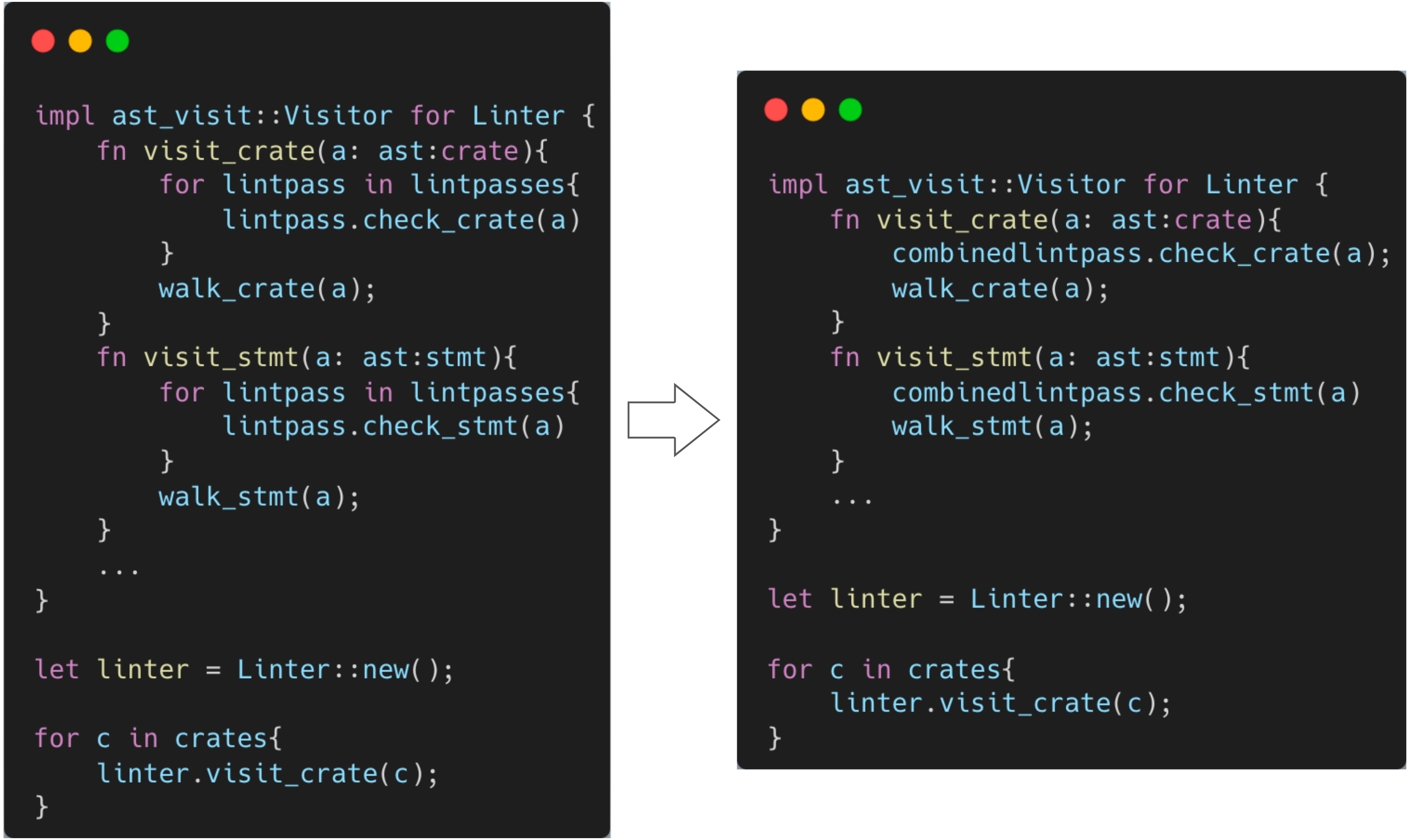
Here, we use check_* of CombinedLintPass to run lint check when traversing the AST.
Although the effect is the same as before, because of the macro, all check_* methods and lintpass to be executed are collected into a structure, which is easier to manage. Similarly, because combinedlintpass actually calls the check methods of each lintpass, although the call may be as complex as the following figure, most of the check methods defined in lintpass are empty checks(just a {}) generated by macros, there will be no performance loss.
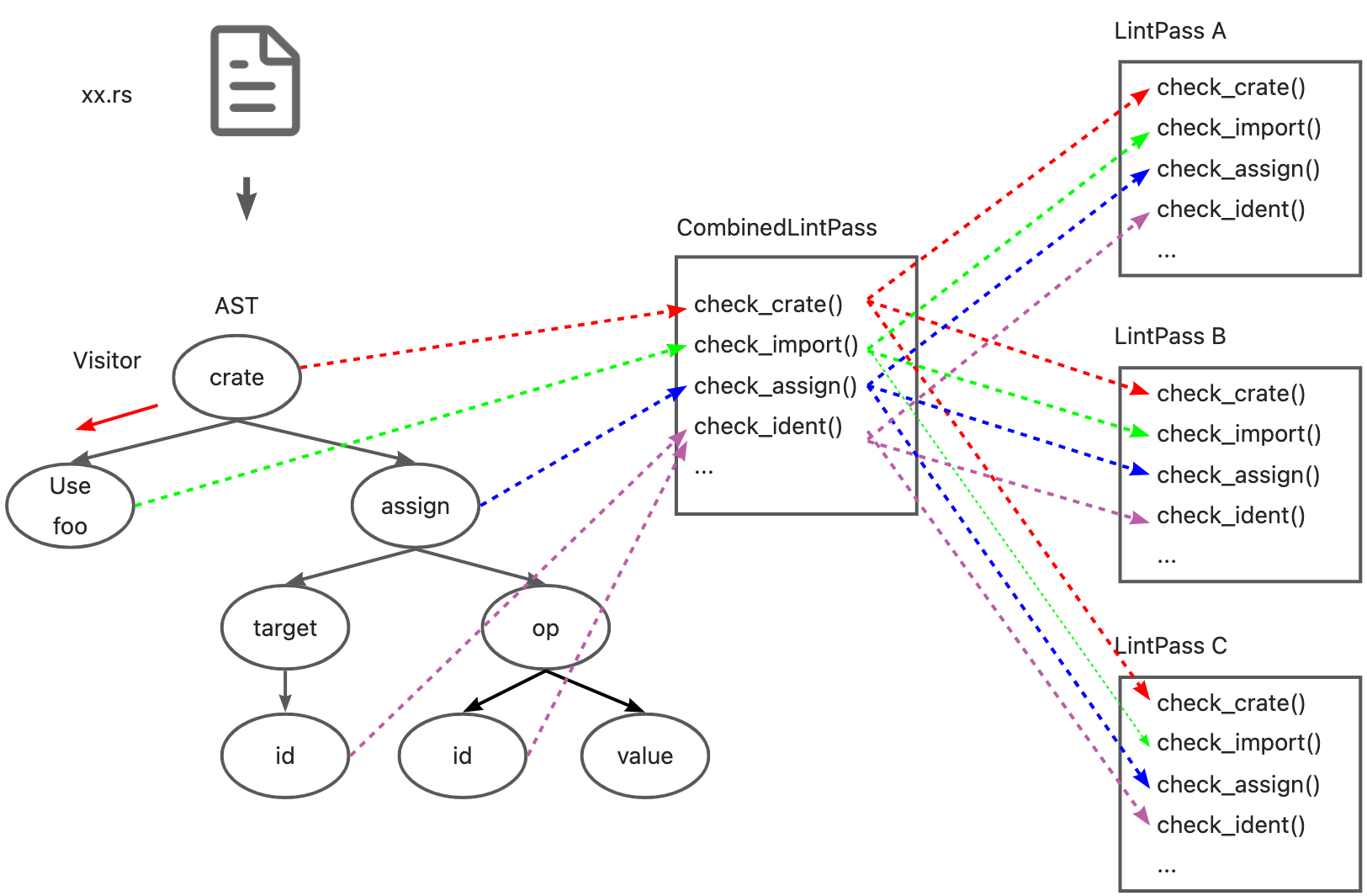
How Lint Works in Rustc
Finally, let's see how lint works in Rustc.
Lint's execution phase in Rustc
Rustc's design is similar to classic compilers, including lexical analysis, syntax analysis, semantic analysis, IR generation, IR optimization, code generation and other processes. In addition, some special processes, such as borrowing check, have been added to the compiler for Rust feature. Correspondingly, the intermediate representation of the code in the whole compilation process also has some extensions. I found the explanation of IR in the rust-dev-guide:
- Token stream: the lexer produces a stream of tokens directly from the source code. This stream of tokens is easier for the parser to deal with than raw text.
- Abstract Syntax Tree (AST): the abstract syntax tree is built from the stream of tokens produced by the lexer. It represents pretty much exactly what the user wrote. It helps to do some syntactic sanity checking (e.g. checking that a type is expected where the user wrote one).
- High-level IR (HIR): This is a sort of desugared AST. It's still close to what the user wrote syntactically, but it includes some implicit things such as some elided lifetimes, etc. This IR is amenable to type checking.
- Typed HIR (THIR): This is an intermediate between HIR and MIR, and used to be called High-level Abstract IR (HAIR). It is like the HIR but it is fully typed and a bit more desugared (e.g. method calls and implicit dereferences are made fully explicit). Moreover, it is easier to lower to MIR from THIR than from HIR.
- Middle-level IR (MIR): This IR is basically a Control-Flow Graph (CFG). A CFG is a type of diagram that shows the basic blocks of a program and how control flow can go between them. Likewise, MIR also has a bunch of basic blocks with simple typed statements inside them (e.g. assignment, simple computations, etc) and control flow edges to other basic blocks (e.g., calls, dropping values). MIR is used for borrow checking and other important dataflow-based checks, such as checking for uninitialized values. It is also used for a series of optimizations and for constant evaluation (via MIRI). Because MIR is still generic, we can do a lot of analyses here more efficiently than after monomorphization.
- LLVM IR: This is the standard form of all input to the LLVM compiler. LLVM IR is a sort of typed assembly language with lots of annotations. It's a standard format that is used by all compilers that use LLVM (e.g. the clang C compiler also outputs LLVM IR). LLVM IR is designed to be easy for other compilers to emit and also rich enough for LLVM to run a bunch of optimizations on it.
The above conversion process of Rust's IR also reflects the whole compilation process of Rust, which is summarized in one figure:
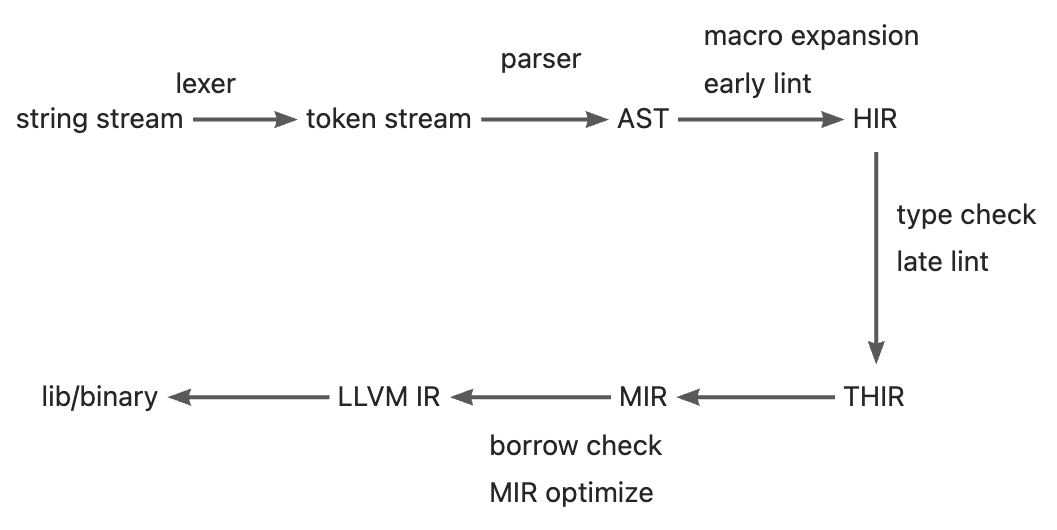 `rustc_ driver::lib. Rs' controls each stage of the compilation process:
`rustc_ driver::lib. Rs' controls each stage of the compilation process:
#![allow(unused)] fn main() { fn run_compiler(...) -> interface::Result<()> { ... interface::run_compiler(config, |compiler| { let linker = compiler.enter(|queries| { ... queries.parse()?; // lexer parse ... queries.expansion()?; // resolver ... queries.prepare_outputs()?; ... queries.global_ctxt()?; // ast -> hir ... queries.ongoing_codegen()?; ... } } }
As described previously, lint is divided into early and late, which are executed in phases of AST -> HIR and HIR -> THIR respectively. Here we will also take the example of WhileTrue to see the whole process of Lint from definition to registration and execution. Meanwhile, WhileTrue is one of built-in early lint and is included in BuiltinCombinedEarlyLintPass.
Definition
Definitions of WhileTrue's lint and lintpass are defined in rustc_lint/src/builtin.rs:
#![allow(unused)] fn main() { declare_lint! { /// The `while_true` lint detects `while true { }`. /// /// ### Example /// /// ```rust,no_run /// while true { /// /// } /// ``` /// /// {{produces}} /// /// ### Explanation /// /// `while true` should be replaced with `loop`. A `loop` expression is /// the preferred way to write an infinite loop because it more directly /// expresses the intent of the loop. WHILE_TRUE, Warn, "suggest using `loop { }` instead of `while true { }`" } declare_lint_pass!(WhileTrue => [WHILE_TRUE]); impl EarlyLintPass for WhileTrue { fn check_expr(&mut self, cx: &EarlyContext<'_>, e: &ast::Expr) { ... } } }
As described previously,
- Macro
declare_lintdeclare a lint:WHILE_TRUE - Macro
declare_lint_passdeclare a lint:WhileTrue - Implement the
check_*methods defined inEarlyLintPassforWHILE_TRUE. Because this lintpass only checks the expr node, it only needs to implementcheck_ expr()method.
Registration
Whiletrue does not require separate registration and execution. Its checking method is expanded into BuiltinCombinedEarlyLintPass by macro. The BuiltinCombinedEarlyLintPass register and execute in the method queries.expansion().
#![allow(unused)] fn main() { pub fn expansion( &self, ) -> Result<&Query<(Rc<ast::Crate>, Rc<RefCell<BoxedResolver>>, Lrc<LintStore>)>> { tracing::trace!("expansion"); self.expansion.compute(|| { let crate_name = self.crate_name()?.peek().clone(); // register let (krate, lint_store) = self.register_plugins()?.take(); let _timer = self.session().timer("configure_and_expand"); let sess = self.session(); let mut resolver = passes::create_resolver( sess.clone(), self.codegen_backend().metadata_loader(), &krate, &crate_name, ); let krate = resolver.access(|resolver| { // execute passes::configure_and_expand(sess, &lint_store, krate, &crate_name, resolver) })?; Ok((Rc::new(krate), Rc::new(RefCell::new(resolver)), lint_store)) }) } }
The registration process will generate a defined lint structure and add it to the LintStore. Lint is divided into four categories: pre-expansion, early, late and late-module. Although lintpasses are executed at different stages in the compilation process, registration occurs at the same time.
The function call of lint registration process is as follows:
- rustc_driver::lib::run_compiler()
- rustc_interface::queries::Queries.expansion()
- rustc_interface::queries::Queries.register_plugins()
- rustc_lint::lib::new_lint_store()
- rustc_lint::lib::register_builtins()
Here, the default compilation process will execute the statement in the else branch, BuiltinCombinedEarlyLintPass::get_lints() will generate WhileTrue and added it to LintStore.
#![allow(unused)] fn main() { if no_interleave_lints { pre_expansion_lint_passes!(register_passes, register_pre_expansion_pass); early_lint_passes!(register_passes, register_early_pass); late_lint_passes!(register_passes, register_late_pass); late_lint_mod_passes!(register_passes, register_late_mod_pass); } else { store.register_lints(&BuiltinCombinedPreExpansionLintPass::get_lints()); store.register_lints(&BuiltinCombinedEarlyLintPass::get_lints()); store.register_lints(&BuiltinCombinedModuleLateLintPass::get_lints()); store.register_lints(&BuiltinCombinedLateLintPass::get_lints()); } }
Execution
The execution of different lintpass occurs at different stages of the compilation process. The function call of the BuiltinCombinedEarlyLintPass execution process are as follows:
- rustc_driver::lib::run_compiler()
- rustc_interface::queries::Queries.expansion()
- rustc_interface::passes::configure_and_expand()
- rustc_lint::early::check_ast_node()
- rustc_lint::early::early_lint_node()
首先,在 configure_and_expand() 函数中,执行了 pre-expansion 和 early 两种 lintpass。注册时使用了 BuiltinCombinedEarlyLintPass::get_lints() 方法生成 lints,而这里用 BuiltinCombinedEarlyLintPass::new() 方法生成了 lintpass。
First, in function configure_ and_expand(), pre-expansion and early lintpass are executed. Lints which generated by BuiltinCombinedEarlyLintPass::get_lints() were used for registration, and here, and lintpasses which generated by BuiltinCombinedEarlyLintPass::new() were used for execution.
#![allow(unused)] fn main() { pub fn configure_and_expand( sess: &Session, lint_store: &LintStore, mut krate: ast::Crate, crate_name: &str, resolver: &mut Resolver<'_>, ) -> Result<ast::Crate> { pre_expansion_lint(sess, lint_store, resolver.registered_tools(), &krate, crate_name); ... sess.time("early_lint_checks", || { let lint_buffer = Some(std::mem::take(resolver.lint_buffer())); rustc_lint::check_ast_node( sess, false, lint_store, resolver.registered_tools(), lint_buffer, rustc_lint::BuiltinCombinedEarlyLintPass::new(), &krate, ) }); } }
Lint execution finally occurs in function rustc_lint::early::early_lint_node(). Compare early_ lint_ Node() and the pseudo-code at the end of the CombinedLintPass section:
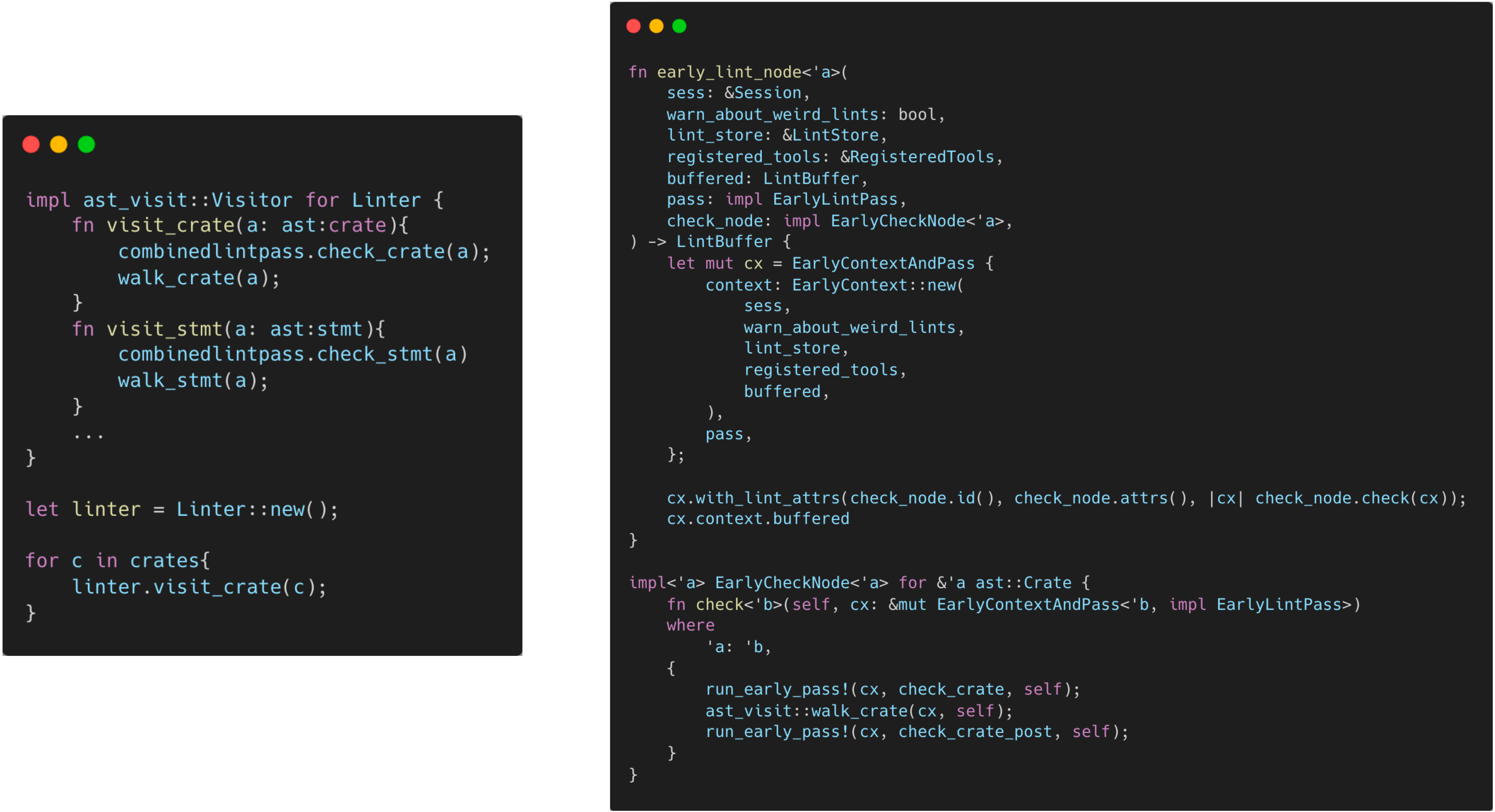
They have the following relationship:
- The parameter
passis theBuiltinCombinedEarlyLintPasscreated inconfigure_and_expand(). It corresponds tocombinedlintpass。. EarlyContextAndPasscombinedpassandcontext, and implement thevisitor. It corresponds toLinter.check_node.check(cx)callcx.pass.check_crate()and execute lint check. According to the definition ofBuiltinCombinedEarlyLintPass, this method will call allcheck_crate()defined in builtin early lint, and runast_visit::walk_crate()to traverses sub-node. It corresponds tovisit_crate().
no_interleave_lints
Although Rustc combines lintpass into combinedlintpass in consideration of performance, it provides some compilation parameters to configure lint. Among them, the parameter no_interleave_lints is used in the registration and execution of lint. This parameter defaults to false, indicating whether to execute each lint separately. By modifying this parameter during compilation, each lint can be registered separately and lintpass can be executed separately. This design provides better flexibility and customization (for example, you can benchmark each lint separately).
#![allow(unused)] fn main() { if no_interleave_lints { pre_expansion_lint_passes!(register_passes, register_pre_expansion_pass); early_lint_passes!(register_passes, register_early_pass); late_lint_passes!(register_passes, register_late_pass); late_lint_mod_passes!(register_passes, register_late_mod_pass); } else { store.register_lints(&BuiltinCombinedPreExpansionLintPass::get_lints()); store.register_lints(&BuiltinCombinedEarlyLintPass::get_lints()); store.register_lints(&BuiltinCombinedModuleLateLintPass::get_lints()); store.register_lints(&BuiltinCombinedLateLintPass::get_lints()); } }
#![allow(unused)] fn main() { pub fn check_ast_node<'a>(...) { if sess.opts.debugging_opts.no_interleave_lints { for (i, pass) in passes.iter_mut().enumerate() { buffered = sess.prof.extra_verbose_generic_activity("run_lint", pass.name()).run(|| { early_lint_node( sess, !pre_expansion && i == 0, lint_store, registered_tools, buffered, EarlyLintPassObjects { lints: slice::from_mut(pass) }, check_node, ) }); } } else { buffered = early_lint_node( sess, !pre_expansion, lint_store, registered_tools, buffered, builtin_lints, check_node, ); ... } } }
Summary
So far, we have analyzed the complete process of a lint in Rustc, including defining a lint, implementing the corresponding lintpass, registration and execution. We can also use these macros to define new lint and lintpass (e.g., extension in Clippy. It works in a similar way). Of course, lint in Rustc is far more than that. I only share a small part of it that I can understand and I have learned. I hope it can help you.
In addition to this, we have practiced part of this content in Project KCLVM. You can find more detailed design and implementation of lint in issue and PR, including the definition of visitor, lint, lintpass, combinedlintpass, and execution of lint in resolver. Welcome for your comments.